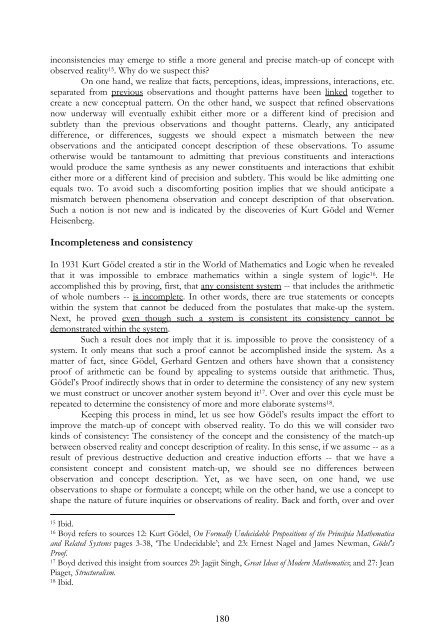Science, Strategy and War The Strategic Theory of ... - Boekje Pienter
Science, Strategy and War The Strategic Theory of ... - Boekje Pienter
Science, Strategy and War The Strategic Theory of ... - Boekje Pienter
Create successful ePaper yourself
Turn your PDF publications into a flip-book with our unique Google optimized e-Paper software.
inconsistencies may emerge to stifle a more general <strong>and</strong> precise match-up <strong>of</strong> concept withobserved reality 15 . Why do we suspect this?On one h<strong>and</strong>, we realize that facts, perceptions, ideas, impressions, interactions, etc.separated from previous observations <strong>and</strong> thought patterns have been linked together tocreate a new conceptual pattern. On the other h<strong>and</strong>, we suspect that refined observationsnow underway will eventually exhibit either more or a different kind <strong>of</strong> precision <strong>and</strong>subtlety than the previous observations <strong>and</strong> thought patterns. Clearly, any anticipateddifference, or differences, suggests we should expect a mismatch between the newobservations <strong>and</strong> the anticipated concept description <strong>of</strong> these observations. To assumeotherwise would be tantamount to admitting that previous constituents <strong>and</strong> interactionswould produce the same synthesis as any newer constituents <strong>and</strong> interactions that exhibiteither more or a different kind <strong>of</strong> precision <strong>and</strong> subtlety. This would be like admitting oneequals two. To avoid such a discomforting position implies that we should anticipate amismatch between phenomena observation <strong>and</strong> concept description <strong>of</strong> that observation.Such a notion is not new <strong>and</strong> is indicated by the discoveries <strong>of</strong> Kurt Gödel <strong>and</strong> WernerHeisenberg.Incompleteness <strong>and</strong> consistencyIn 1931 Kurt Gödel created a stir in the World <strong>of</strong> Mathematics <strong>and</strong> Logic when he revealedthat it was impossible to embrace mathematics within a single system <strong>of</strong> logic 16 . Heaccomplished this by proving, first, that any consistent system -- that includes the arithmetic<strong>of</strong> whole numbers -- is incomplete. In other words, there are true statements or conceptswithin the system that cannot be deduced from the postulates that make-up the system.Next, he proved even though such a system is consistent its consistency cannot bedemonstrated within the system.Such a result does not imply that it is. impossible to prove the consistency <strong>of</strong> asystem. It only means that such a pro<strong>of</strong> cannot be accomplished inside the system. As amatter <strong>of</strong> fact, since Gödel, Gerhard Gentzen <strong>and</strong> others have shown that a consistencypro<strong>of</strong> <strong>of</strong> arithmetic can be found by appealing to systems outside that arithmetic. Thus,Gödel’s Pro<strong>of</strong> indirectly shows that in order to determine the consistency <strong>of</strong> any new systemwe must construct or uncover another system beyond it 17 . Over <strong>and</strong> over this cycle must berepeated to determine the consistency <strong>of</strong> more <strong>and</strong> more elaborate systems 18 .Keeping this process in mind, let us see how Gödel’s results impact the effort toimprove the match-up <strong>of</strong> concept with observed reality. To do this we will consider twokinds <strong>of</strong> consistency: <strong>The</strong> consistency <strong>of</strong> the concept <strong>and</strong> the consistency <strong>of</strong> the match-upbetween observed reality <strong>and</strong> concept description <strong>of</strong> reality. In this sense, if we assume -- as aresult <strong>of</strong> previous destructive deduction <strong>and</strong> creative induction efforts -- that we have aconsistent concept <strong>and</strong> consistent match-up, we should see no differences betweenobservation <strong>and</strong> concept description. Yet, as we have seen, on one h<strong>and</strong>, we useobservations to shape or formulate a concept; while on the other h<strong>and</strong>, we use a concept toshape the nature <strong>of</strong> future inquiries or observations <strong>of</strong> reality. Back <strong>and</strong> forth, over <strong>and</strong> over15 Ibid.16 Boyd refers to sources 12: Kurt Gödel, On Formally Undecidable Propositions <strong>of</strong> the Principia Mathematica<strong>and</strong> Related Systems pages 3-38, ‘<strong>The</strong> Undecidable’; <strong>and</strong> 23: Ernest Nagel <strong>and</strong> James Newman, Gödel'sPro<strong>of</strong>.17 Boyd derived this insight from sources 29: Jagjit Singh, Great Ideas <strong>of</strong> Modern Mathematics; <strong>and</strong> 27: JeanPiaget, Structuralism.18 Ibid.180
















